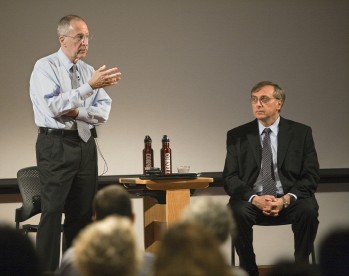UPDATE
Recommitting to ideals during a period of great challenge

President David Skorton, left, and Provost Kent Fuchs at one of several strategic planning discussions held with students, faculty and staff this past semester. See larger image
Nearly a decade into the 21st century and just a few short years away from Cornell's sesquicentennial in 2015, we must recommit ourselves to the ideals and mission of our great university while reshaping Cornell for the challenges of contemporary times.
The past 18 months have held particular challenges. Most urgent has been to reduce what was expected to be a $215 million annual budget deficit by 2015, while simultaneously "Reimagining Cornell" as a stronger, more focused university. We have worked to streamline support operations and implement other significant cuts without compromising our ability to grow in the future.
We approach our challenges with a profound sense of confidence, bolstered in part by the participation of eight of Cornell's most distinguished faculty members, with reputations among their colleagues for being strategic thinkers and doers, who are helping create a clear vision and plan for Cornell's future. The work of this Strategic Plan Advisory Council, which is being carried out through four working groups, is being informed by recommendations from 20 academic task force reports as well as by plans from the colleges and schools and will result in a draft strategic plan for the university.
More meetings will be held next semester with the campus community to get feedback and reaction to the emerging strategic plan's key concepts. A public draft of the full plan will be released in March, followed by another period of public commentary. The final plan will be issued in May.
During this process, we have found that we need to shift our focus from the physical structure of the university -- from bricks and mortar -- to the people who make Cornell great. The faculty is the soul of our great university, and we must return as soon as possible to a healthy pace of faculty hiring, which we attenuated in order to address our pressing financial difficulties. And we must continue to invest in our students so that Cornell can remain the nation's original "opportunity university."
Throughout this comprehensive planning effort, we have never lost sight of the fact that the path to Cornell's future is through its past. We will get to our future by remembering Cornell's ideas and ideals. These are the four pillars on which Cornell University was built:
- Classical and contemporary inquiry that balances scientific and technical literacy with history, politics and language studies. Expansive and pragmatic, this pillar requires students to acquire knowledge and think critically about it. This is the most useful and the most versatile education of all.
- Faculty who think "otherwise." In the Cornell tradition of promoting and protecting academic freedom and independent thought, we must ensure that our efforts to build the faculty of the future follow a faculty-driven trajectory and are not imposed from the top down.
- Education for the brightest students, regardless of their ability to pay. This pillar remains more relevant today than ever. In 2015, the university will welcome a hugely diverse array of students, as it has from its beginning. Even during the extended global financial downturn, Cornell increased financial aid, which remains one of the highest priorities in our universitywide campaign, and this year enrolled the most racially diverse first-year class in the university's history.
- Public engagement that continues to expand in depth and breadth. Cornell Cooperative Extension, for example, will diversify its local and regional programs in areas such as energy, the environment, nutrition, finances and personal health. And with 3,300 of our 20,000 students already coming from other nations, Cornell will continue to serve as the land-grant university to the world.
This is where we come from. This is the path we must follow. And in all this, our New York City-based faculty, students and facilities must and will play a vital role. Collaborations between Weill Cornell Medical College and the activities in Ithaca and elsewhere will multiply, and our network of alumni around the world will continue to lead and contribute to the solution of the world's pressing challenges.
We aim to create, on the solid foundation of our four pillars, an ever more exciting and innovative future for Cornell. We ask you to continue to be part of it.